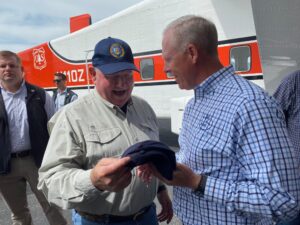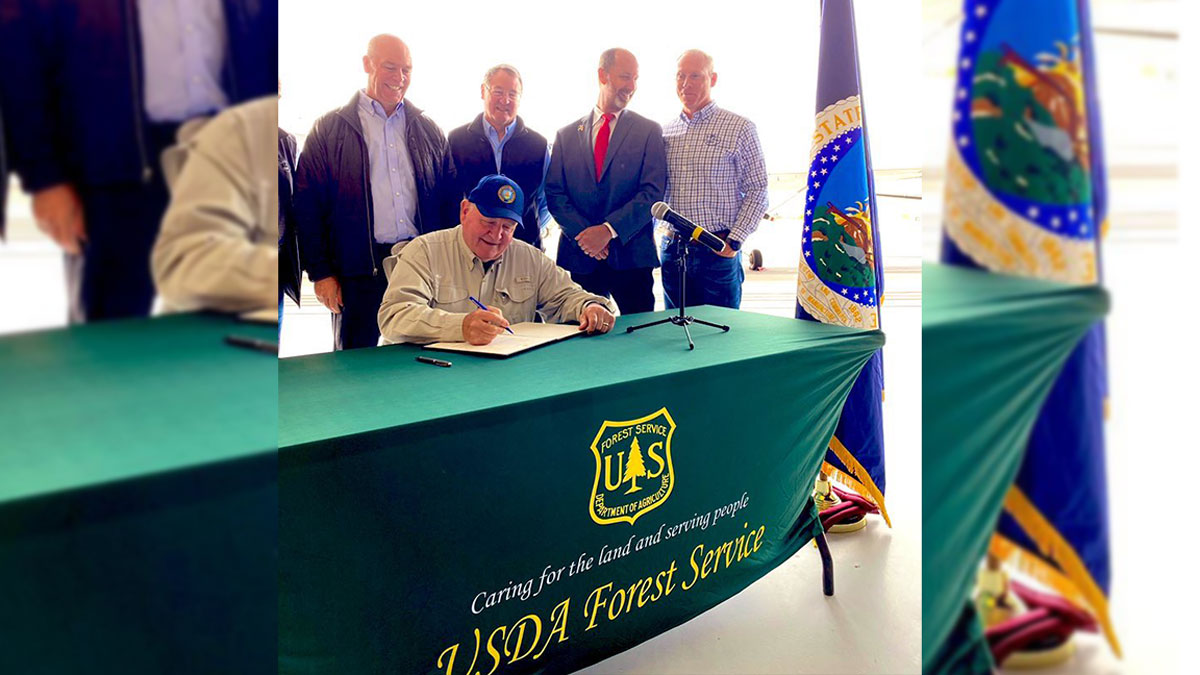With the stroke of a pen, U.S. Department of Agriculture Secretary Sonny Perdue recently signed a memorandum seeking to ensure the health of America’s forests. And he did so with several members of the Rocky Mountain Elk Foundation looking on.
“Under this administration, the Forest Service has sold more timber than we have in the last 22 years and made significant increases in our hazardous fuels treatments and active management of our national forests. While I am proud of our progress to promote active management, reduce hazardous fuels, work across boundaries and increase the resiliency of our nation’s forests and grasslands, I believe more can be done,” said Secretary Perdue. “Today, I am announcing a blueprint for reforms to provide further relief from burdensome regulations, improve customer service, and boost the productivity of our national forest system.”

“RMEF appreciates the significant strides the Forest Service has made in active management, shared stewardship, NEPA modernization, public access improvements, wildfire funding and hazardous fuels reduction under Secretary Perdue’s direction,” said Kyle Weaver, RMEF president and CEO. “The Forest Service, RMEF and our partners face continued challenges in completing stewardship and access projects. Obstacles such as the Cottonwood decision, overly lengthy and complicated environmental review and permitting processes, landlocked parcels and agency real estate staffing capacity all represent significant challenges to our shared mission.”
The secretary’s direction will encompass four areas of the agency’s work:
- Increasing the productivity of national forests and grasslands: The Forest Service will focus on productive use of national forests and grasslands, and identify new opportunities to deliver goods and services the American people efficiently and effectively.
- Valuing our Nation’s grazing heritage and the national grasslands: The Forest Service will recognize grazing on national grasslands as essential for their management and streamline range improvements and the permit renewal process to reduce burdens and improve customer service for America’s grazers.
- Increasing access to national forest system lands: The Forest Service will modernize and simplify the permitting process to increase public access to national forests and grasslands.
- Expediting environmental reviews to support active management: The Forest Service will streamline their environmental review process through greater accountability for efficient decision making, succinct and understandable documentation, and focus and effective public engagement.
Earlier in the day Secretary Perdue, USDA Undersecretary for Natural Resources & the Environment James Hubbard, RMEF staffers, government dignitaries and others visited a RMEF habitat enhancement project site just east of Missoula, Montana, utilized grant funding provided by RMEF to complete prescribed fire and selective timber removal to create early seral habitat to benefit elk and other wildlife and to reduce hazardous fuel loads in the wildland-urban interface.
“This is a visual example of what we’re talking about, well-managed forests versus not-yet-managed forests,” Secretary Perdue told the Missoulian. “We’re talking about a forest that’s resilient to fire, better for wildlife, better for recreation, better for beauty, hiking and other multiple uses as well as water quality, and all of that makes a huge difference.”
“The Marshall Woods Restoration Project is a perfect example of how our two missions align, using management tools to rejuvenate browse and create high quality forage for elk on both winter and summer ranges,” said Karie Decker, RMEF habitat stewardship director. “RMEF has helped the Forest Service implement more than 3,300 wildlife habitat enhancement, land protection and public access improvement projects on more than three million acres and has directly contributed more than $28 million to projects with the Forest Service. The total conservation value of the RMEF-Forest Service partnership is estimated at more than $285 million.”
Among others in attendance included Congressman Greg Gianforte (R-MT), Chuck Roady of F.H. Stoltze Land & Lumber Company and Montana Stockgrowers Association President Bryan Mussard. Senator Steve Daines (R-MT) was scheduled to appear but had to remain in Washington, D.C. for a key vote on the Great American Outdoors Act. He sent a video message played at the signing.
(Photo sources: Rocky Mountain Elk Foundation & U.S. Department of Agriculture)
